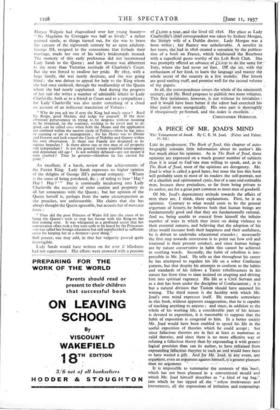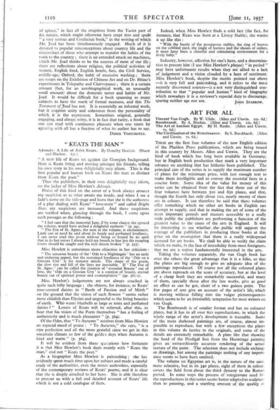APIECE OF MR. JOAD'S MIND
The Thstarnent of Joad. By C. E. M. Joad. (Faber and Faber. Es. 6d.)
LIKE its predecessor; The Book of Joad, this chapter of auto- biography contains little information about its author's life but =di ahOut his opinions. As in The Book of load, these opinions -are expressed on a much greater number of subjects than itis nitlal to fncrone man willing to speak, and, as in The Book of Joad, most of the opinions are derogatory. Mr. Joad is what is called a good hater, but none the less this book will probably seem ti■ most of its readers the self-portrait, not of a churlish and opinionated cynic, but of a sane and estimable man, because these prejudices, so far from being private to its author, are for a great part common to most men of goodwill.
Of Mr. Joad's depreciatory attitude towards the affairs of men there are, I think, three explanations. First, he is an optimist. Contrary to what would seem to be the general argument of history, he believes both that human beings are fundamentally good and that they are fundamentally rational. And so, being unable to conceal from himself the infinite number of ways in which they insist on doing violence to their essential natures, and believing that the adoption of his ideas would increase both their happiness and their usefulness, he is driven to undertake educational crusades ; necessarily the first step towards conversion is to point out how evil and irrational is their present conduct, and since human beings are by nature conservative in habit this cannot be achieved in soothing words. Secondly, the habit of rebellion is irre- pressible in Mr. Joad. He tells us that throughout his career he has attempted to regulate his life on a sober Confucian pattern, but that despite his attempts to conform to the habits and standards of his fellows a Taoist rebelliousness in his nature has from time to time insisted on erupting and driving him into spiritual vagrancy. His life as a Civil Servant and as a don has been under the discipline of Confucianism ; it is but a natural division that Taoism should have annexed his writing. The third reason 'is the lucidity with which Mr. Joad's own mind expresses itself. He remarks somewhere in this book, without apparent exaggeration, that he is capable of teaching anything to anyone ; and since, in addition to the whole of his working life, a considerable part of his leisure is devoted to exposition, it is reasonable to suppose that the habit of exposition is congenial to him. In a better society Mr. Joad would have been enabled to spend his life in the useful exposition of theories which he could accept ; but since fallacious theories are in fact at least as numerous as valid theories, and since there is no more effective way of refuting a fallacious theory than by expounding it with greater logical precision than can its author, to have ,refrained from expounding fallacioni theories to such an -end vioida have been . _ _ _ to have wasted a gift., And y Mr. Joad, in any event, any argiuqent, even an argument against liimselfyksli.greater pleasure than no argument. - - - - It is impossible to -sutrunarise the 'contents of this "book, which has not been planned in a conventional mould 'and which Mr. Joad himself describes as "a kind of rag bag," into whidh he has tipped all the "refuse irrelevances and irreverences, all the expressions of irritation and outpourings of spleen," in fact all the eruptions from the Taoist part of his nature, which might otherwise have crept into and spoilt "a very serious and Confucian book," in the writing of:which Mr. Joad has been simultaneously engaged. Much of it "is devoted to popular misconceptions about country life and the misconduct of those who attempt to transfer the habits of the town to the country ; there is air extended attack on machines,- which Mr. Joad thinks to be the sources of most Of our ills ; there are reflections about religion, the politiCal- activities Of women, English food, English hotels, furs, the Civil Service, middle-age,' Oxford, the habit of excessive washing; - 'the-re are essays on the Exhibition of Chinese Art and on Dr. Rhine's experiments in Telepathy and Clairvoyance ; "there is a certain amount (but, for an autobiographical work, an unusually small amount) about the domestic tastes and habits of Mr. Joad. It would be difficult for i book spanning so many subjects to have the merit of formal neatness, and this The Testi:intent' of joad has not: It is essentially an informal work, but it aCqUireS unity and- coherence from the personality of which it is the expression. Sometimes original, generally engaging, and always witty, it is in fact that rarity, a book that one can read with continuous pleasure when one starts by agreeing with all but a fraction of what its author has to say.
DERE1C VERSCHOYLE.

























































 Previous page
Previous page